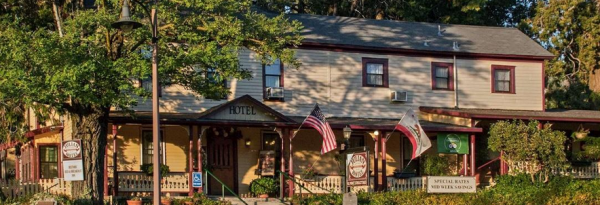 By Miriam Raftery
By Miriam Raftery
Photo, left via Calico Ranch on Facebook: Fred Coleman discovered gold, starting the Julian Gold Rush in 1869.
February 21, 2023 (Julian) - Many San Diego County residents have visited Julian, a historic gold rush town in the Cuyamaca Mountains. Some may know that is was founded by former Confederate soldiers after the Civil War. But many are likely unaware of the black settlers who also played key roles in the town’s history.
It was Fred Coleman from Kentucky, a freed slave and rancher who discovered gold in a stream on what is now Calico Rancho; his find started Julian’s gold rush in 1869. Coleman married a member of the Santa Ysabel tribe. He had previously been a miner in Northern California. The Coleman Mining District in what is now known as Julian was named for him, and he served as its first recorder.
America Newton, a widow and formerly enslaved black woman, and her daughter, Clara, came to Julian from Kansas and started a laundry business that served war veterans, European immigrants, Native Americans, and newly freed African-Americans. She used her work ethic to build a new life of freedom.
In 1897, Albert Robinson, a former slave from Missouri, founded the Hotel Robinson along with his wife, Margaret on the site of a bakery and restaurant that they had operated. Today called the Julian Gold Rush Hotel, the bed and breakfast inn is still in operation today and is a nationally designated historical landmark.
 Photo by Miriam Raftery: Julian Gold Rush Hotel.
Photo by Miriam Raftery: Julian Gold Rush Hotel.
According to Smithsonian Magazine, black entrepreneurs such as Newton, Robinson and Coleman “confronted severe obstacles: racism, poverty and lawlessness that pervaded the region…That’s what makes their entrepreneurial accomplishments all the more remarkable.”
While African-Americans in the post-civil war era were often unable to find a job, in Julian, those who started their own businesses fared better.
America Newton worked as a housekeeper for a man named James Cole back in Kansas, and he accompanied Newton and her daughter to California. Cole helped Newton file to own an 80-acre homestead just outside Julian and built her a cabin next door to his own home.
She ran her business from her cabin, carrying buckets of water from a spring nearby and heating irons over a grill in the fireplace, also chopping her own wood and driving her horse and buggy around town to deliver clean wash. And for those who stopped by her business, she’d also serve up water or a homemade liquor drink along with local gossip.
Valorie Ashley, cofounder of the Julian African American Pioneers History Committee, once said, ““Everybody knew America, and America knew everything” about what was going on in Julian.







Recent comments